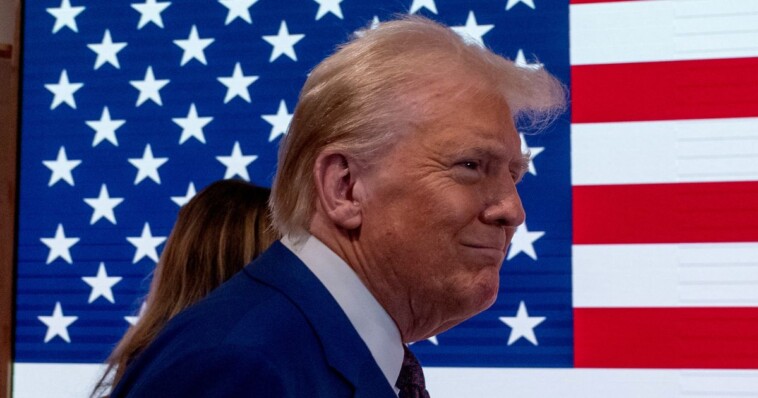
President-elect Donald Trump walks onto the floor of the New York Stock Exchange in New York City on Thursday. (Spencer Platt / Getty Images)
Trump Triggers Big Government Union with Simple Message About Working
By Ben Zeisloft December 17, 2024 at 6:17am
President-elect Donald Trump is already putting his foot down on remote work.
The incoming commander-in-chief said in no uncertain terms on Monday that he was not down with President Joe Biden’s last-minute effort to strike a deal with the American Federation of Government Employees union and the Social Security Administration to lock in “current levels of telework” for the next four years.
“If people don’t come back to work, come back into the office, they’re going to be dismissed, and somebody in the Biden administration gave a five-year waiver of that. So that for five years, people don’t have to come back into the office,” Trump said of the deal during a news conference at his Mar-a-Lago estate in Florida, according to Fox Business.
“It involved 49,000 people for five years. They don’t have to go,” he added. “They just signed this thing. It’s ridiculous. So it was like a gift to a union, and we’re going to obviously be in court to stop it.”
Top officials at the American Federation of Government Employees, needless to say, were not pleased.
Everett Kelley, the national president of the union, responded to the comments from the president-elect, saying, they “support telework where it delivers for both the taxpayers and the workers who serve them.”
“Telework and remote work are tools that have helped the federal government increase productivity and efficiency, maintain continuity of operations, and increase disaster preparedness,” the union boss insisted. “These policies also assist agencies across the government, including the Social Security Administration, in recruiting and retaining top talent.”
Kelley also denied “rumors of widespread federal telework,” claiming they are simply “untrue.”
But one report from Iowa Republican Sen. Joni Ernst would beg to differ.
Are remote work options a good thing?
That report revealed there are some federal agencies, like the Department of Energy and the Department of Agriculture, where only a tiny fraction of bureaucrats show up for work.
At the former agency, which has a seating capacity of nearly 5,000 employees, an average of eight employees showed up for work in the office on any particular day last year.
At the latter agency, there were less than 500, despite a capacity of 7,400 employees.
To some extent, telework can truly improve the lives of employees. But that is more of a privilege than a right, as some businessmen have learned the hard way in recent years.
Elon Musk, for example, shut down the “work from home forever” policy at Twitter once he purchased the social media platform two years ago, according to CNBC. That move came soon after he told all employees at Tesla to work at least 40 hours per week in the office or find work elsewhere.
If the most intelligent and capable employees in the private sector are most productive in the office, then the same general standards should be expected for government employees.
That is why Musk and Vivek Ramaswamy, who were charged by Trump to lead the newly founded Department of Government Efficiency, plan to end most remote work on day one.
“Requiring federal employees to come to the office five days a week would result in a wave of voluntary terminations that we welcome,” the entrepreneurs reasoned in an article for The Wall Street Journal. “If federal employees don’t want to show up, American taxpayers shouldn’t pay them for the COVID-era privilege of staying home.”
If these most recent comments from Trump are any indication, that tough love approach may be the new status quo.
Advertise with The Western Journal and reach millions of highly engaged readers, while supporting our work. Advertise Today.



